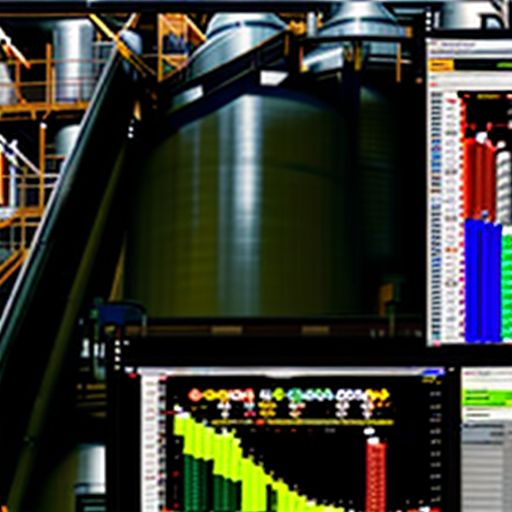Imagine a world where your production line flows seamlessly, raw materials transform into finished goods with minimal waste, and real-time data empowers you to make informed decisions. This is the promise of Erp Software For Process Manufacturing.
Understanding the Powerhouse: What is Erp Software For Process Manufacturing?
At its core, Enterprise Resource Planning (ERP) software integrates all facets of a business, from finance and inventory to production and customer relationship management, into a unified system. However, when tailored for process manufacturing, ERP goes beyond simply connecting departments – it becomes the backbone of your entire operation.
Process manufacturing distinguishes itself from discrete manufacturing in that it deals with formulas and recipes rather than bills of materials. Think of mixing ingredients to bake a cake (process) versus assembling parts for a car (discrete). This distinction necessitates specialized ERP capabilities, and that’s where ERP software for process manufacturing shines.
Key Features that Set it Apart:
- Formula and Recipe Management: Precisely define and manage your formulas and recipes, ensuring consistency and quality control.
- Lot and Batch Tracking: Trace raw materials and finished goods through every stage, enabling robust recall management and compliance.
- Production Planning & Scheduling: Optimize production runs, minimize downtime, and react quickly to changing demands.
- Quality Control & Compliance: Implement stringent quality checks at each step, adhering to industry regulations and customer expectations.
- Costing and Reporting: Gain real-time visibility into production costs, identify areas for optimization, and make data-driven decisions.
erp.cungphuthe.com/wp-content/uploads/2024/07/process-manufacturing-dashboard-669361.jpg" alt="Process Manufacturing Dashboard" width="512" height="512">Process Manufacturing Dashboard
Why is ERP Software Critical for Process Manufacturers?
In today’s competitive landscape, process manufacturers face mounting pressure to deliver high-quality products at the lowest possible cost. This necessitates streamlined operations, maximized efficiency, and agile responses to market fluctuations.
Here’s where ERP software becomes indispensable:
- Enhanced Efficiency: Eliminate manual processes, reduce errors, and optimize resource allocation for a leaner, more productive operation.
- Improved Collaboration: Break down silos between departments, fostering seamless communication and data sharing across the organization.
- Real-time Decision Making: Access up-to-the-minute data on production, inventory, sales, and more, empowering you to make agile, informed decisions.
- Reduced Costs: Identify bottlenecks, minimize waste, and optimize resource utilization to drive significant cost savings.
- Enhanced Customer Satisfaction: Deliver consistent product quality, meet delivery deadlines, and provide superior service, leading to increased customer loyalty.
Navigating Your Options: Frequently Asked Questions about ERP for Process Manufacturing
Choosing the right ERP software can be a daunting task. Here are some common questions to guide your decision:
What industries benefit most from process manufacturing ERP?
Process manufacturing ERP is highly beneficial for industries such as:
- Food and Beverage
- Chemicals
- Pharmaceuticals
- Cosmetics
- Paints and Coatings
What are the different deployment models for process manufacturing ERP?
ERP systems can be deployed:
- On-Premise: Installed and managed on your own servers.
- Cloud-Based: Accessed via the internet and managed by a third-party provider (SaaS).
- Hybrid: A combination of on-premise and cloud-based solutions.
How much does process manufacturing ERP software cost?
Costs vary significantly based on factors such as:
- Number of users
- Features and modules required
- Deployment model (on-premise, cloud, hybrid)
- Implementation and training expenses
What is the implementation timeline for process manufacturing ERP?
Implementation timelines can range from a few months to over a year, depending on the complexity of your business and the chosen ERP system.
The Bottom Line: Investing in Your Future
Implementing ERP software for process manufacturing is not merely a technology upgrade; it’s a strategic investment in your company’s future. By automating processes, improving collaboration, and providing real-time insights, ERP empowers you to optimize your operations, drive profitability, and stay ahead of the competition.
Ready to explore the transformative potential of ERP for your process manufacturing business? We encourage you to share your thoughts, questions, and experiences in the comments below. Let’s start a conversation and navigate this exciting journey together.
